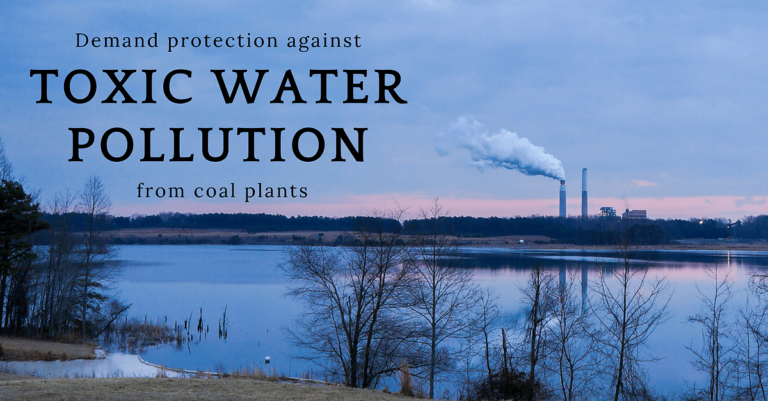The Largest Source of Toxic Water Pollution | Dive Into Democracy
By: Larissa Liebmann

Every year, over 2 billion pounds of pollutants are dumped into our waterways by power plants – the largest source of toxic water pollution in our country. This wastewater contains heavy metals and chemicals known to harm human health, like lead, mercury and arsenic. Approximately 23,000 miles of rivers and streams in the United States are contaminated because of this pollution, including many drinking water sources. Many of these dangerous contaminants become more concentrated in animals as they move up the food chain, which means the impacts to the ecosystem go beyond just aquatic animals – they can hurt or kill any animals that eat the contaminated fish — including humans.
This toxic wastewater comes from the leftover ash that coal power plants produce when they burn coal to produce electricity. For decades, power plants had no limitations on the levels of toxics they were allowed to put into waterways. Instead, communities downstream bore the costs when public drinking water required more expensive treatments. In 2015, the Environmental Protection Agency (EPA) finally issued a regulation that addressed this massive source of unregulated pollution: the Effluent Limitation Guidelines and Standards for Steam Electric Power Plants, often referred to as the “ELG rule.” This rule requires power generators to stop discharging many of these toxics into our waterways. Rather than clean up their pollution, power plant companies challenged the rule in court.
Now, Scott Pruitt’s EPA is caving to industry demands and is trying to take away these long-overdue protections. Pruitt wants to go backward and allow power plants to continue to dump their toxic wastewater into waterways. As part of this process, EPA issued a notice explaining its disastrous plan to allow over 2 billion pounds of toxic chemicals in water to contaminate waterways every year and the public has been invited to comment on it. This week, we are asking you to tell EPA why power plants should not get a free pass to poison our waterways and our children.
It is easy to comment using this website. We have provided a comment template below that you can use, but please consider personalizing it and explaining why getting chemical pollution out of our waterways and drinking water sources is so important to you! The comment period will close on July 6th — please submit your comment today!
I am writing to ask that you not postpone the compliance dates under the Effluent Limitation Guidelines and Standards for Steam Electric Power Plants (“ELG rule”). Postponing and rewriting this rule will delay long needed reductions in toxic pollution to drinking water sources for communities and waterways around the country.
The ELG rule was already long overdue. Before it was finalized in 2015, the technology-based effluent guidelines for coal-fired power plant discharge had not been updated since 1982. This delay in creating meaningful limitations on toxic pollutants are the reason why coal-fired power plants are now the largest source of toxic water pollution in the country.
Power plants discharge lead, mercury, arsenic, cadmium and many other dangerous toxic pollutants into our waterways. These toxins have contaminated over 23,000 miles of rivers and are linked to cancer and neurological damage. They also bioaccumulate in fish and wildlife, further harming public health. These toxic pollutants harm communities around the country and the ELG rule is a very feasible plan to drastically reduce this harm.
The technology to stop these pollutants from entering waterways is available and affordable. Many power plants are already implementing it. Rolling back the ELG rule will not make the costs associated with these pollutants disappear – it will just push costs from the power plant companies onto the public. Communities will continue to have their sources of drinking water contaminated. Power plant companies should reduce the pollution that they create, not contaminate communities downstream.
I urge you to reconsider this action and allow the long-awaited and very necessary ELG rule to be fully implemented under the schedule set forth in the ELG Rule.
Sincerely,
[YOUR NAME]